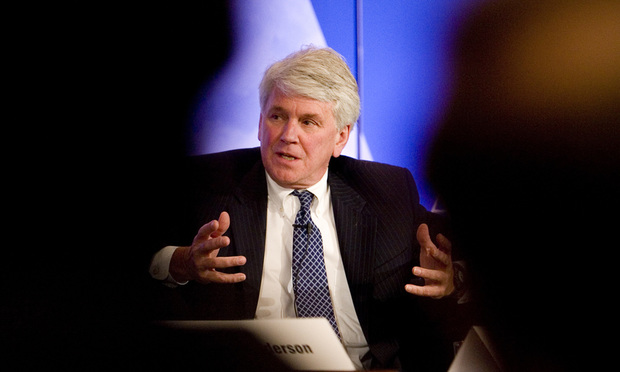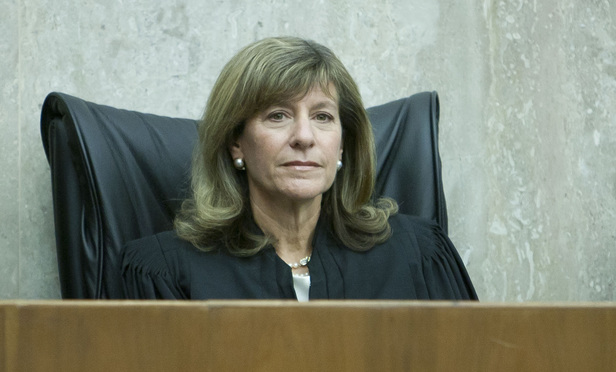Do-Over: How Greg Craig's Trial Hit a Snag
U.S. District Judge Amy Berman Jackson defended closed-door jury selection proceedings. But the trial is starting over Wednesday, with a new set of prospective jurors.
August 13, 2019 at 01:47 PM
5 minute read
The original version of this story was published on National Law Journal
 Gregory Craig speaking in Washington in 2008. Photo: Diego M. Radzinschi/ALM.
Gregory Craig speaking in Washington in 2008. Photo: Diego M. Radzinschi/ALM.
The trial of Greg Craig was unexpectedly thrown off-course Tuesday when defense lawyers for the former White House counsel objected to a jury selection that has played out largely behind closed doors, prompting a Washington federal judge to restart the process from scratch.
U.S. District Judge Amy Berman Jackson of the District of Columbia barred the public from sitting in on the bulk of questioning Monday, a step she said would protect the privacy of jurors in the closely watched case. Prosecutors and Craig’s defense team did not object at the time, and after hours of reviewing potential jurors, the two sides had been expected to present opening statements Tuesday.
Instead, Jackson spent the second day of Craig’s trial addressing questions about whether the closed-door questioning of jurors had violated his rights to a fair trial under the Sixth Amendment. A defense lawyer for Craig, Zuckerman Spaeder partner William Murphy, said the Justice Department had initially raised that concern following Monday’s proceedings.
Murphy said the Justice Department’s concerns had taken Craig’s defense team “by surprise.” “In thinking about it all in hindsight,” Murphy said, Craig’s defense team came to share those concerns.
“Are you telling me we need to start over?” Jackson asked.
“Yes,” Murphy replied.
After taking an hour-long recess, Jackson said she would summon between 120 and 125 new jurors for questioning that will begin Wednesday. The remaining jurors from the initial pool of 70 were dismissed.
 U.S. District Judge Amy Berman Jackson. Photo: Diego M. Radzinschi/ALM
U.S. District Judge Amy Berman Jackson. Photo: Diego M. Radzinschi/ALMMurphy on Tuesday also raised separate concerns about steps the court had taken to ensure that the initial pool of jurors would be available for a two-week trial in August. The so-called “pre-selection” process allowed some prospective jurors to learn in advance that they were being called in connection with Craig’s case, Murphy said.
When Jackson agreed to draw from a general pool of jurors, rather than a prescreened group, Murphy said, “I think that’s the safest course, your honor.”
“We want the regular people,” he added, to laughter from the courtroom.
Craig, who served as President Barack Obama’s first White House counsel, was charged in April with misleading the Justice Department about his work for Ukraine during his time as a partner at Skadden, Arps, Slate, Meagher & Flom. Prosecutors have alleged that Craig deceived the Justice Department to avoid disclosing his Ukraine work under the Foreign Agents Registration Act, a law requiring the disclosure of foreign influence in the U.S.
Although Jackson agreed to begin jury selection anew, she defended her initial decision to close the courtroom, saying it was intended to give prospective jurors the comfort to provide “complete and candidate answers.” It also removed the need for lawyers to repeatedly gather at the bench under the veil of white noise, known as the “husher,” to hear jurors respond to sensitive questions.
“This procedure, I think, made the process easier for the parties and the lawyers,” Jackson said.
During Monday’s proceedings, she said, one juror discussed a mental illness and another mentioned a family member who’d been convicted of an “egregious crime.”
Jackson said she would advise prospective jurors Wednesday that they could respond sensitive questions with the “husher” turned on.
On Monday, before shutting the public out of her courtroom, Jackson allowed several reporters to observe a round of initial questioning in which jurors gave written answers. On blue note cards, the jurors responded to 26 questions designed to discern whether they would bring any improper bias to Craig’s case.
The larger, newly called juror pool will gather Wednesday in the ceremonial courtroom of the E. Barrett Prettyman U.S. Courthouse in Washington to give written answers to the same 26 questions. The individual questioning will be held in Jackson’s courtroom.
“If someone wants to come in and watch it, they will watch it,” Jackson said.
With the delay in jury selection, Craig’s trial is now expected to stretch past Labor Day. During a lighter exchange Tuesday, Jackson recalled that Murphy had vacation plans the Friday before the long weekend.
“I don’t know why I remember your vacation schedule, but I do,” Jackson said.
“For me, it’s a four-day weekend,” Murphy replied, drawing further laughter from the courtroom.
Read more:
Greg Craig’s Trial: The Foreign-Lobbying Registration Case That Isn’t
Quinn’s William Burck Is Now a Registered ‘Foreign Agent’ for Kuwaiti Contractor
Registering as a ‘Foreign Agent’? Why Law Firms and Lobby Shops Might Demur.
Manafort Judge Says Foreign Lobbying Law Is No ‘Pesky Regulation’
The Curious Case of Joe Lieberman’s Work as a Lobbyist Who Isn’t ‘Advocating’
Greg Craig, Defiant After Lobbying Charges, Will Plead Not Guilty
This content has been archived. It is available through our partners, LexisNexis® and Bloomberg Law.
To view this content, please continue to their sites.
Not a Lexis Subscriber?
Subscribe Now
Not a Bloomberg Law Subscriber?
Subscribe Now
NOT FOR REPRINT
© 2025 ALM Global, LLC, All Rights Reserved. Request academic re-use from www.copyright.com. All other uses, submit a request to [email protected]. For more information visit Asset & Logo Licensing.
You Might Like
View All
An ‘Indiana Jones Moment’: Mayer Brown’s John Nadolenco and Kelly Kramer on the 10-Year Legal Saga of the Bahia Emerald


Travis Lenkner Returns to Burford Capital With an Eye on Future Growth Opportunities

Legal Speak's 'Sidebar With Saul' Part V: Strange Days of Trump Trial Culminate in Historic Verdict
1 minute readTrending Stories
- 16-48. It’s Comp Time Again: How To Crush Your Comp Memo
- 2'Religious Discrimination'?: 4th Circuit Revives Challenge to Employer Vaccine Mandate
- 3Fight Over Amicus-Funding Disclosure Surfaces in Google Play Appeal
- 4The Power of Student Prior Knowledge in Legal Education
- 5Chicago Cubs' IP Claim to Continue Against Wrigley View Rooftop, Judge Rules
Who Got The Work
Michael G. Bongiorno, Andrew Scott Dulberg and Elizabeth E. Driscoll from Wilmer Cutler Pickering Hale and Dorr have stepped in to represent Symbotic Inc., an A.I.-enabled technology platform that focuses on increasing supply chain efficiency, and other defendants in a pending shareholder derivative lawsuit. The case, filed Oct. 2 in Massachusetts District Court by the Brown Law Firm on behalf of Stephen Austen, accuses certain officers and directors of misleading investors in regard to Symbotic's potential for margin growth by failing to disclose that the company was not equipped to timely deploy its systems or manage expenses through project delays. The case, assigned to U.S. District Judge Nathaniel M. Gorton, is 1:24-cv-12522, Austen v. Cohen et al.
Who Got The Work
Edmund Polubinski and Marie Killmond of Davis Polk & Wardwell have entered appearances for data platform software development company MongoDB and other defendants in a pending shareholder derivative lawsuit. The action, filed Oct. 7 in New York Southern District Court by the Brown Law Firm, accuses the company's directors and/or officers of falsely expressing confidence in the company’s restructuring of its sales incentive plan and downplaying the severity of decreases in its upfront commitments. The case is 1:24-cv-07594, Roy v. Ittycheria et al.
Who Got The Work
Amy O. Bruchs and Kurt F. Ellison of Michael Best & Friedrich have entered appearances for Epic Systems Corp. in a pending employment discrimination lawsuit. The suit was filed Sept. 7 in Wisconsin Western District Court by Levine Eisberner LLC and Siri & Glimstad on behalf of a project manager who claims that he was wrongfully terminated after applying for a religious exemption to the defendant's COVID-19 vaccine mandate. The case, assigned to U.S. Magistrate Judge Anita Marie Boor, is 3:24-cv-00630, Secker, Nathan v. Epic Systems Corporation.
Who Got The Work
David X. Sullivan, Thomas J. Finn and Gregory A. Hall from McCarter & English have entered appearances for Sunrun Installation Services in a pending civil rights lawsuit. The complaint was filed Sept. 4 in Connecticut District Court by attorney Robert M. Berke on behalf of former employee George Edward Steins, who was arrested and charged with employing an unregistered home improvement salesperson. The complaint alleges that had Sunrun informed the Connecticut Department of Consumer Protection that the plaintiff's employment had ended in 2017 and that he no longer held Sunrun's home improvement contractor license, he would not have been hit with charges, which were dismissed in May 2024. The case, assigned to U.S. District Judge Jeffrey A. Meyer, is 3:24-cv-01423, Steins v. Sunrun, Inc. et al.
Who Got The Work
Greenberg Traurig shareholder Joshua L. Raskin has entered an appearance for boohoo.com UK Ltd. in a pending patent infringement lawsuit. The suit, filed Sept. 3 in Texas Eastern District Court by Rozier Hardt McDonough on behalf of Alto Dynamics, asserts five patents related to an online shopping platform. The case, assigned to U.S. District Judge Rodney Gilstrap, is 2:24-cv-00719, Alto Dynamics, LLC v. boohoo.com UK Limited.
Featured Firms
Law Offices of Gary Martin Hays & Associates, P.C.
(470) 294-1674
Law Offices of Mark E. Salomone
(857) 444-6468
Smith & Hassler
(713) 739-1250






